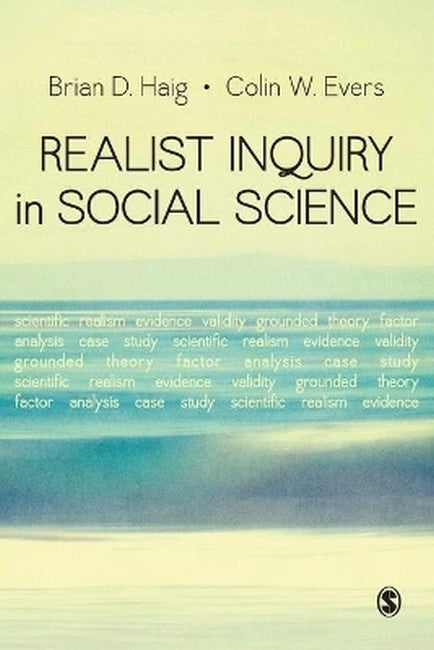Brian Haig is a Professor in the Department of Psychology at the University of Canterbury, and a Visiting Professor in the Department of Education at the University of Bath. He is a theoretical psychologist who has published numerous articles in psychology, education, and philosophy journals on the conceptual foundations of quantitative and qualitative research methods, and the nature of psychological science more generally. He recently published a book entitled Investigating the Psychological World (MIT Press, 2014). He is a Fellow of the Association for Psychological Science and the New Zealand Psychological Society. Colin Evers is Professor of Educational Leadership at the University of New South Wales, having previously worked at The University of Hong Kong, Monash University, and the University of Sydney. He studied mathematics, philosophy, and education before taking his PhD in philosophy of education at the University of Sydney. His teaching and research interests are in educational administration, philosophy of education, and research methodology. He has co-edited and co-authored ten books in his various fields of interest including Knowing Educational Administration, Exploring Educational Administration and Doing Educational Administration (all written with Gabriele Lakomski and published by Pergamon/Elsevier) and many papers.
Request Academic Copy
Please copy the ISBN for submitting review copy form
Description
Chapter 1: Scientific Realism What is Realism? Naturalistic Realism Global and Local Realism Realist Methodology The Centrality of Method Realism in the Social Sciences Chapter 2: Evidence Social Science Preliminaries Empirical Evidence and Theory Coherentism and Naturalism Varieties of Evidence: Pragmatic Considerations Chapter 3: Validity Test Validity, Operational Definition, and Logical Empiricism Holism, Realism, and Ontological Commitment Construct Validity and Logical Empiricism Construct Validity, Generalization in Experiments, and Epistemology Paradigms of Validity Coherence Justification Chapter 4: Grounded Theory The Abductive Theory of Method Problem Formulation Phenomena Detection Theory Construction ATOM as Grounded Theory Method Chapter 5: Factor Analysis Exploratory Factor Analysis and Scientific Inference Methodological Challenges to Exploratory Factor Analysis Exploratory Factor Analysis and Other Factor Analytic Methods Chapter 6: Case Study Constitutive and Regulative Rules What is A Case? Generalizing From Cases A Case Study in China Making Generalizations Improving Knowledge of Generalizations
The current replication crisis in psychology makes professors' Haig and Evers book as timely as it is erudite. Using philosophical realism as their organizing principle, they take the reader on a creative and insightful tour through validity, Grounded Theory, factor analysis and case studies in an effort to improve and advance psychological research. -- James W. Grice Realist Inquiry in Social Science comes as a complete breath of fresh air in a domain predominated by anti-realism. I was especially charmed and mesmerized by its recognition of the primacy of problems and its focus on abductive reasoning. -- Tim De Mey This book provides an accessible and systematic introduction to Realist methodologies in the social sciences. It covers qualitative and quantitative research methods from a Realist perspective, making clear how this approach provides a fruitful and practical way for social scientists to approach research methods. That a book of such clarity should have been written by Brian Haig and Colin Evers is not surprising. Over the past three decades, Realism has moved from the periphery of methodological considerations to taking centre stage. In the social sciences these authors have been central to the change in Realism's fortunes. -- Hugh Lauder

